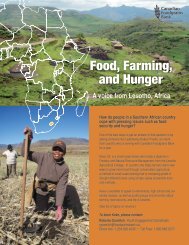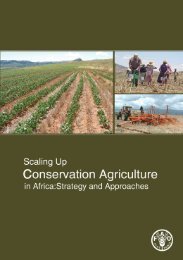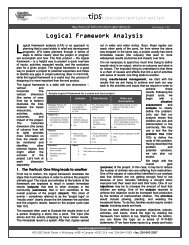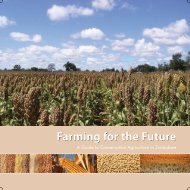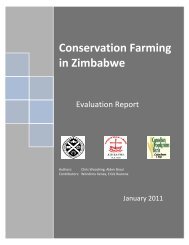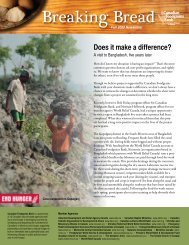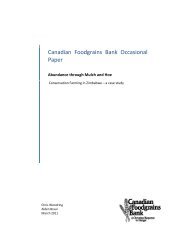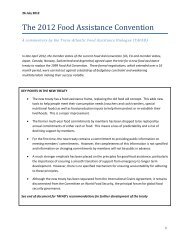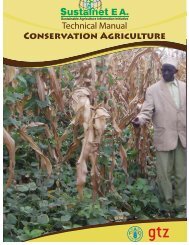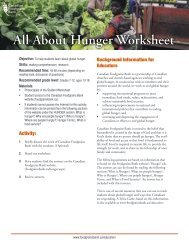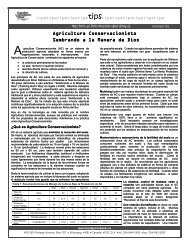Restoring the Soil - Canadian Foodgrains Bank
Restoring the Soil - Canadian Foodgrains Bank
Restoring the Soil - Canadian Foodgrains Bank
You also want an ePaper? Increase the reach of your titles
YUMPU automatically turns print PDFs into web optimized ePapers that Google loves.
12Existing Green Manure/Cover Cropping Systems Around The World13. The ecological advantages of trees. When we use tree gm/ccs as dispersed shade,we also gain <strong>the</strong> ecological advantages provided by trees: soil and crops are protectedfrom <strong>the</strong> tropical sun, soil moisture is conserved (because evaporation and transpirationrates are reduced), and desertification is curbed.When we compare <strong>the</strong> above advantages to those of composting, we find that in <strong>the</strong>vast majority of cases, gm/ccs will be far more attractive to farmers than composting.Gm/ccs provide weed control, food, and many o<strong>the</strong>r products and advantages, withmuch lower transport and labor costs than compost (Photo 8). The exception wouldbe those cases where farmers are growing very high-value crops and/or own a verylimited amount of land (less than half a hectare, for instance), so that <strong>the</strong>re is virtuallyno space where <strong>the</strong> gm/ccs can grow.Each of <strong>the</strong> above advantages should be analyzed and weighed when choosing whichgm/ccs to use and promote. Experience shows that farmers are rarely attractedprimarily by <strong>the</strong> gm/ccs’ ability to increase soil fertility. More commonly, farmers aremost motivated by <strong>the</strong> gm/ccs’ potential for human consumption (usually <strong>the</strong> highestpriority of <strong>the</strong> above advantages) or <strong>the</strong>ir ability to control weeds. Therefore, gm/ccs should be promoted mostly by emphasizing <strong>the</strong>se o<strong>the</strong>r advantages, not just <strong>the</strong>advantage of increasing soil fertility. For instance, sometimes we refer to a gm/cc as a“food crop” or a “green herbicide.”Disadvantages of Green Manure/Cover CropsDespite all <strong>the</strong>se advantages, gm/ccs are sometimes difficult to introduce to farmers.While working with <strong>the</strong> international development organization World Neighborsduring <strong>the</strong> 1980s, I tried for eight years to introduce <strong>the</strong> use of mucuna to farmers incentral Honduras, with very little success. This was because I didn’t understand someof <strong>the</strong> important disadvantages of gm/ccs. If we fail to overcome <strong>the</strong>se disadvantages,we will not be successful at introducing gm/ccs. In a few situations, <strong>the</strong>se disadvantageswill mean we should not try to introduce gm/ccs at all.1. The opportunity cost of <strong>the</strong> land. Farmers normally will not plant something thatonly fertilizes <strong>the</strong>ir soil if <strong>the</strong> land could instead be planted with ei<strong>the</strong>r food crops orcash crops. Unless <strong>the</strong> gm/ccs also produce food, <strong>the</strong> land used to grow gm/ccs musthave no o<strong>the</strong>r valuable use (i.e.: it must have no “opportunity cost,” meaning <strong>the</strong>“cost” represented by not taking advantage of an “opportunity” to do something elsewith <strong>the</strong> land). Traditional green manure systems from temperate countries requirefarmers to monocrop green manures on <strong>the</strong>ir land before planting <strong>the</strong>ir regular crop,thus taking o<strong>the</strong>rwise useful land out of production for a few months in order to produce<strong>the</strong> green manure. These systems did not recognize <strong>the</strong> need to use land that hadno o<strong>the</strong>r profitable use—which is probably why <strong>the</strong> introduction of green manuresinto <strong>the</strong> developing world before <strong>the</strong> 1970s was rarely successful.



